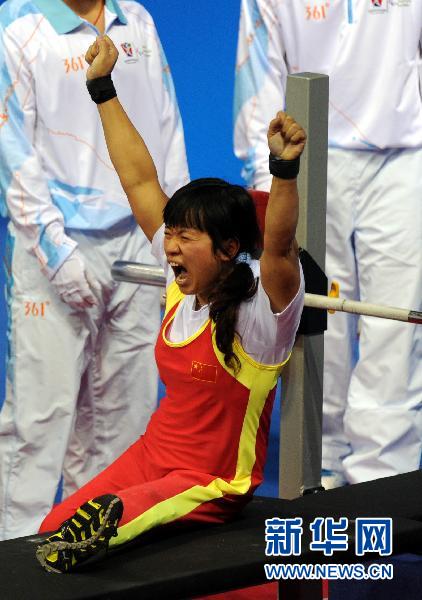A Chinese orphan's pursuit of happiness

Fu Tiecan sat in the news conference room, surrounded by a crowd of reporters and flashlights. Childhood memories suddenly came in to her mind, and then she burst into tears.
"I want to thank my parents who brought me to the world. Although they abandoned me, I still want to say 'I love you' to them," said a crying Fu, who claimed the title of 40 kilogram category powerlifting in the Guangzhou 2010 Asian Para Games on Monday.
Her name is Fu Tiecan, a very uncommon name in Chinese. The family name "Fu" indicates the orphanage where she grew up. "Tie" indicates the railway where she was found abandoned, and "Can" indicates the disability caused by infantile paralysis.
"My parents abandoned me on the railway when I was three or four. I think they did not want me to live in this world. I don't know why. I started to cry and fortunately, before the next train came and hit me, I was found by a patrolling policeman and sent to the orphanage," said the 28-year-old as she was interviewed by Xinhua on Tuesday. And this time, again, she could not hold her tears.
Fu grew up in this orphanage in Jiangxi Province, and was given this name, which suggests her miserable childhood. However, she was not doomed by the name. In Chinese, "Fu" can be associated with the orphanage and also can mean happiness.
When God closes a door, he opens a window. In 2002, Fu found the window and began her pursuit of happiness.
A powerlifting coach came to the orphanage and wanted to pick some potential athletes. Twelve disabled orphans went to the trial and only Fu was chosen.
Fu began to train powerlifting with her coach Zhang Haidong and showed a great talent. She only needed five years to make a dent in the national arena when she won a gold medal in the 2007 Chinese National Para Games in Kunming, Yunnan Province.
Sports not only changed Fu's life but also her character. She became more and more optimistic and confident and made a lot of new friends as she often trains and competes across the country.
"My coach is very very important to me. I don't know how to express my gratitude to him, but I just want to say if I had not met him at the first place, my life might be totally different," said a grateful Fu.
As Fu participated in international events more and more frequently, she realized the importance of foreign language. She wanted to communicate with foreign athletes and make friends with them.
She enrolled in Jiangxi Normal College and majored in English, with Japanese being her second foreign language. And she got her bachelor's degree in 2009.
"English is an international language and teaching is very great job. I am very satisfied with my major. I want to become a teacher after I retire from sports. Now I am just waiting for my teaching license," said Fu, who has then become kind of part-time interpreter in the national powerlifting team when they participate in international tournaments.
Now, Fu considers herself as a happy girl. She has a very big family, back in the orphanage, with a lot of uncles and aunties, brothers and sisters, who love and care for each other. She is an Asian champion and she has already blueprinted her future in mind.
Apart from the pursuit of happiness, Fu still has another goal, the pursuit of Paralympic glory. In 2008 Fu missed the chance to compete in the Beijing Paralympics due to a limited quota in the Chinese delegation.
"Every athlete wants to stand on the top podium of the world, so do I. A gold medal in the London Paralympic Games is my goal and I will try even harder in the following two years to achieve it," said an ambitious Fu, a disabled girl whose family name contains the benison of happiness.
 0
0 






